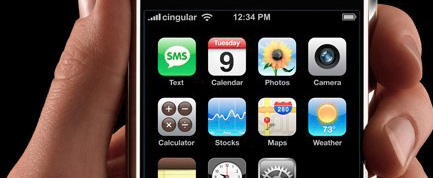Will Leaked iPhone 4G Bruise Apple?

Get the world’s most fascinating discoveries delivered straight to your inbox.
You are now subscribed
Your newsletter sign-up was successful
Want to add more newsletters?

Delivered Daily
Daily Newsletter
Sign up for the latest discoveries, groundbreaking research and fascinating breakthroughs that impact you and the wider world direct to your inbox.

Once a week
Life's Little Mysteries
Feed your curiosity with an exclusive mystery every week, solved with science and delivered direct to your inbox before it's seen anywhere else.

Once a week
How It Works
Sign up to our free science & technology newsletter for your weekly fix of fascinating articles, quick quizzes, amazing images, and more

Delivered daily
Space.com Newsletter
Breaking space news, the latest updates on rocket launches, skywatching events and more!

Once a month
Watch This Space
Sign up to our monthly entertainment newsletter to keep up with all our coverage of the latest sci-fi and space movies, tv shows, games and books.

Once a week
Night Sky This Week
Discover this week's must-see night sky events, moon phases, and stunning astrophotos. Sign up for our skywatching newsletter and explore the universe with us!
Join the club
Get full access to premium articles, exclusive features and a growing list of member rewards.
Consumers got an unintended sneak peak this week at the next generation of the iPhone when the tech blog Gizmodo posted pictures and stories of the device after a hapless Apple employee lost a test version at a California bar weeks ago.
Does this apparent leak from Apple – a company known to zealously guard its products in development – hurt the company or consumers in any way?
While an analyst said it is too soon to tell how the affair will ultimately shake out for Apple, one thing is certain: "Leaks only serve to benefit the consumer, not the business," said Jeff Orr, senior analyst for mobile devices at ABI Research.
Knowledge is power for potential buyers that can influence their later purchasing behavior. This especially holds true for already-available products like the iPhone that have a next-generation version soon to hit stores. Essentially, why buy today's iPhone 3GS when tomorrow's new-and-improved 4G is right around the corner?
At least through the first quarter of this year, the well-publicized, planned roll-out this summer of the next iPhone handset with a beefed-up operating system (already detailed by Apple earlier this month) has not cut into sales. In fact, quite the opposite: Apple sold 8.74 million iPhones the first three months of this year, up 131 percent from first quarter 2009.
Post-leak, however, savvy consumers now have a good idea what they will get if they wait for the iPhone 4G. The test version scoured by Gizmodo includes new features such as a long-awaited forward-facing camera for video conferencing, improved screen resolution, split volume buttons and a secondary microphone for noise cancellation.
Add to the buzz?
Get the world’s most fascinating discoveries delivered straight to your inbox.
Nevertheless, Apple may benefit from the media frenzy over the entertaining particulars of "iPhonegate": a 26-year-old employee named Gray Powell out partying for his birthday left the phone on a bar stool, later stumbled upon by another bar patron who sold the prototype to Gawker Media for $5,000, who then splashed the phone all over its Gizmodo Web site.
People certainly seem to be paying attention to the story: Gizmodo's traffic quadrupled to 20 million page views a day this week, and major media outlets ranging from the New York Times to USA Today have covered iPhonegate.
But this sort of tabloid fodder isn't exactly Apple's modus operandi when it comes to introducing its products.
Over the years, Apple has instead scheduled big media events at its Cupertino, Calif. headquarters and in San Francisco where CEO Steve Jobs – in a black turtleneck and jeans – has shown off his company's latest creation in a controlled environment. (The iPhone's new operating system and the iPad were both revealed in such events this year.)
Apple: off-kilter, off-message?
So for now, Apple would seem to have lost control of its message, with the ongoing brouhaha stealing Jobs' thunder for when he would officially unveil the next iPhone come summertime.
"Some companies and brands like Apple . . . look to control the message," Orr told TechNewsDaily. "They want to be seen as an innovator, the first to think of something or first to package something in a way that is more meaningful than what the market has come to expect. [Apple] think[s] of themselves as revolutionary rather than evolutionary, and are not just putting out another phone or computer."
"By establishing themselves as a company that only announces breakthrough products, [Apple has] to try and keep what's being developed under wraps for as long as possible," Orr said.
Even so, Orr questioned whether Apple will be ultimately hurt by iPhonegate. "If I'm Apple, do I care because of all the attention brought to this device? Yes. But have I actually learned anything that will influence my consumer audience?" That answer's not so clear, Orr said.
Riding and riding out the press wave
Orr said he is not surprised that Apple has remained relatively mum about the potentially flummoxing leak in light of the fact that the storyline thus far has not been about what the new iPhone lacks, or how it could be a failure.
Moreover, the iPhone 4G that got away may not even be the product that Apple eventually has manufactured. During the product development stage, "it's never one product," Orr said. "There's multiple permutations along the way," and the tricky part for some companies is maintaining consumer excitement and interest during the lull between product releases.
As a company, "you want to keep that buzz, to keep your brand and products out in front of the audience as early and often as you can."
In the case of the missing iPhone 4G model, Gray Powell may have done his current employer (at least of this writing) an unscripted marketing favor.
• iPhone 4G Found on Bar Floor? • iPad and iPhone to Finally Get Multitasking • Verizon CEO Has Asked Apple for iPhone
 Live Science Plus
Live Science Plus











